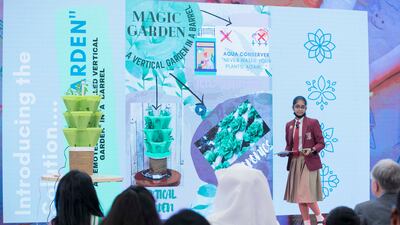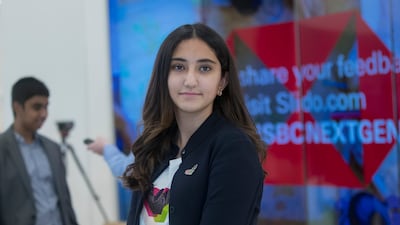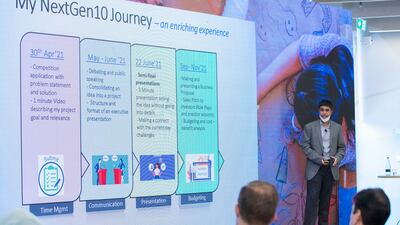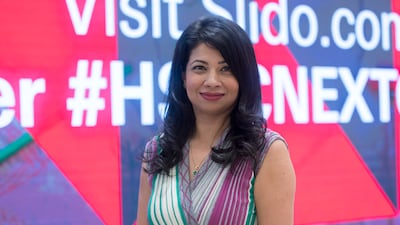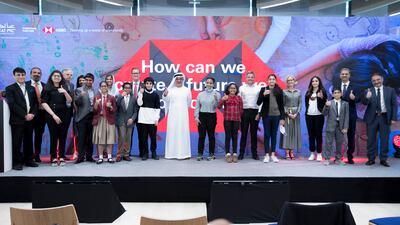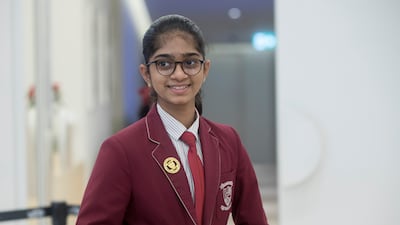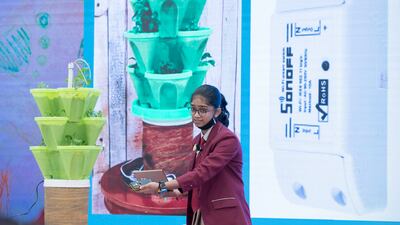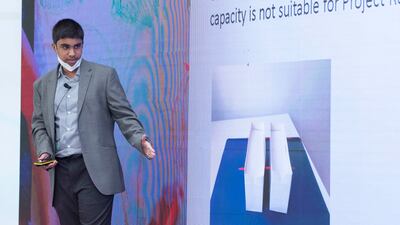The UAE's brightest young minds have their sights set on on tackling the world's biggest challenges after being rewarded for their entrepreneurial spirit with Dh25,000 prizes at an Expo 2020 Dubai event.
Combating climate change and helping people with disabilities were high on the agenda for the winners of the NextGen10 finals held in the UK Pavilion at the world's fair.
The 10 finalists wowed an expert judging panel with presentations about their inventions on Tuesday afternoon.
The winning three invented a drone that carries chemicals to remove pollution as it flies, a system that allows people to water their plants from anywhere in the world and a walking stick for the visually impaired.
HSBC head of sustainability for Europe and the middle East
“Climate change is probably the most important issue in the world right now,” said Indian Tanay Jagannathan, 14, who invented the drone that absorbs carbon dioxide to tackle pollution.
“It has the potential to make or break our future. The likes of Elon Musk are still some time away from taking us to Mars so we have to safeguard Earth until then.
“We’re going to see some of the worst impacts of climate change here in the UAE, with rising temperatures. Being so close to the sea could be an issue too, as rising water levels could lead to floods,” the Gems Modern Academy pupil said.
Tuesday’s event was the showpiece final of the NextGen10 competition held by HSBC in the UAE.
The programme was open to pupils between the ages of 10 and 14 to put forward their vision for the future of the UAE in terms of technology, sustainability and society.
Teen embraces technology for good
Also picking up a cheque for Dh25,000 was Emirati student Maria Falaknaz, 13, who created a walking stick for the visually impaired.
“The walking stick I invented basically acts as an aid for the visually impaired by detecting obstacles and keeping the person using it safe,” the Gems Wellington International pupil said.
“It is able to detect water and fire, if it’s dark or light using an ultrasonic sensor and is made from materials that are not harmful to the environment.”
Sreya Binesh, 13, was the third winner with her system that allows people to water their plants from anywhere in the world.
“My prototype is designed to work on a timer and connects to Wi-Fi, it acts as an irrigation system for vertical gardens, which are common on balconies and terraces where space is limited,” said the Indian pupil at Gems Millennium School, Sharjah.
‘I want to do what I can to help reverse climate change. We all have to do what we can to help, even the smallest gesture, like planting a seed can make a difference.”
Out to make a difference

Sabrin Rahman, HSBC’s head of sustainability in Europe and the Middle East, and part of the judging panel, said the standard of entries in the competition showed the immense talent the region possesses.
“What we are seeing is this region isn’t just about innovation, there is also real social and environmental concern,” she said.
“This group of children have provided practical solutions that only require mentoring and investment to truly take it to the next level.
“It’s incredibly encouraging for the region.”
Ms Rahman said there were more than 3,000 entries in total, which were whittled down to 10 finalists on Tuesday.
“What we saw was a direct reflection of children’s concerns,” she said.
“The fact they want to take a proactive role in addressing those concerns right now is just phenomenal.”
